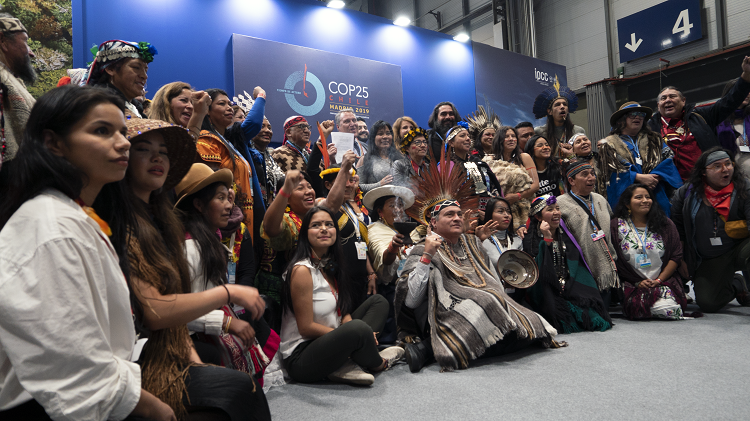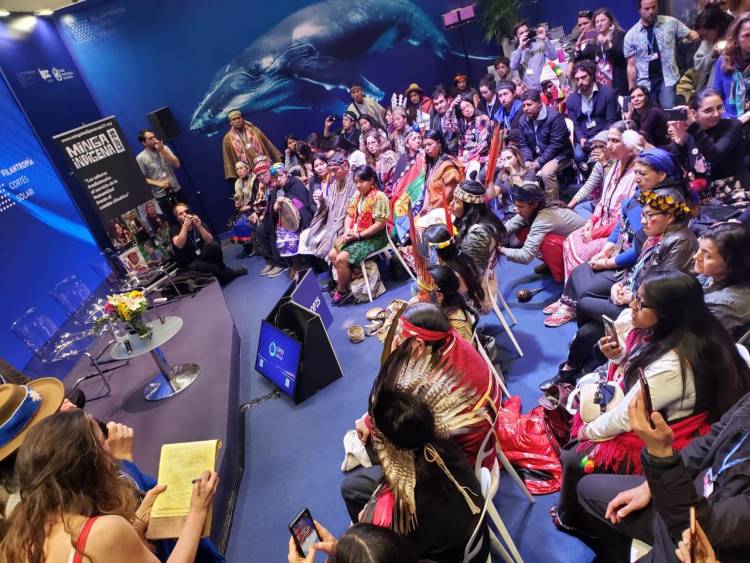By Sucena Shkrada Resk, translated from Portuguese.
In parallel to the 25th United Nations Climate Talks (COP25), Indigenous leaders and activists gathered for MINGA, an Indigenous Summit, where they co-authored and finalized demands for an Indigenous Climate Letter.
The document is both a warning and a compelling claim on Indigenous rights and nature. In a beautiful action, it was hand-delivered on Tuesday, December 10 to selected leaders of the nearly 200 nations participating in the COP 25 summit in Madrid.

The Indigenous Letter Delivery at COP25 in Madrid. Photo: Hugo Duchesne, 350.org
The handover was made to Andres Landerretche, coordinator of the COP25 Presidency, and Gonzalo Muñoz, the ‘High-Level Climate Champion’ of COP25. A ceremony charged with symbolism and energy filled the halls and auditorium with colors, rituals and diversity. The document will also be passed on by Indigenous people in their countries.
“Full and effective participation for free, prior and informed consent should not be understood only as an obligation of States, but as a right to be implemented by the Indigenous peoples and nations themselves, according to their customs and traditions, respecting their political, social and territorial organization, in accordance with 169 ILO Convention and the United Nations Declaration on the Rights of Indigenous Peoples. Community consultation protocols must be binding and respected by States for any action related to our territories, our way of life, and our peoples.”
– Excerpt from the Indigenous Climate letter
Documenting the process
The process of building the Indigenous Climate Charter was initiated in October 2018 by 350.org Latin America’s Indigenous Program. In consultation with leaders of over 400 communities in different Latin American countries, 80 delegates from different peoples traveled to Europe to complete the final version of stakeholders’ claims during the MINGA summit. T The Non-Fracking Coalition Brazil and Latin America (COESUS) also supported the survey of demands.
“We have heard demands that climate conferences should take steps to consult Indigenous peoples, that we should have more space for participation and more clarity on the issues that are discussed at conferences and that there is legitimacy in representation and recognition. In this final stage, the document was joined by Indigenous people from other places, such as the US and the Antilles,” explains Andreia Takua Fernandes, coordinator of the Indigenous Program at 350.org Latin America.
The whole consultation process can be watched in this new documentary, just launched at COP25 in Madrid.
Urgent protection for climate defenders
“These consultations brought vision with spirituality, showing the way of life of different Indigenous peoples, beyond materiality, as well as the current concern for murders of leaders,” says Nicole Figueiredo de Oliveira, Director of 350.org America Latina.
According to Andreia Takua, a permanent claim is that Indigenous peoples be recognized and protected as defenders of nature and the planet.
“We hope there is greater care and attention. We know we are protective and often find ourselves victims of conflict (usually with whites) across the territory, but not because we want a piece of land. But because they are unique areas that are forested, with standing trees and clean water, where the heat is not 40˚C, because there is care for conservation. We are preserving nature for the whole world. If we crossed our arms and left as it is, there would be nothing left”, she says.
Carbon Market Critics
“… (We) reject the commodification of nature, as lands and territories are priceless. Nature-based (NBS), Reduction of Deforestation Emissions and Forest Degradation (REDD +) and other compensation programs are not real solutions to crises. It is only neo-colonialist solutions that bring conflict within our peoples … ” – Excerpt from the Indigenous climate letter charter at COP25, which reflects Article 6 of the Paris Agreement on carbon markets.
“This point about combating the financing and commodification of nature was one of the most important in my assessment, because companies continue to have major impacts through oil production, ore, timber, agribusiness. They don’t take responsibility for the damage they have caused,”said Ninawa Inu Huni Kuī, president of the Huni Kui People’s Federation of Acre (FEPHAC), a delegate to MINGA and one of the guests at the 350.org Latin America Indigenous Program delegation.
“In the letter, Mother Earth is recognized and declared as a subject of rights, because for us, the effects of the climate crisis are nothing more than the cry of help from the Earth’.
According to Nicole Figueiredo de Oliveira, Article 6 of the Paris Agreement establishes carbon market mechanisms that do not prevent contamination and violation of human rights. “They become a fiction to speculate on climate change,” she says.
According to Andreia Takua, the groups expect and demand that the Indigenous MINGA space be officially recognized by climate conferences. “It needs to be a link for Indigenous peoples to the listening process. And we should have a pre -COP committee or working group so that next time we can take the demands to the official negotiating space. And, it is important that Article 6 of the Paris Agreement be deleted,” she says.

Photo: Nicole Oliveira, 350.org
The Letter also issues a warning against fossil fuels:
“… If oil, gas, minerals and coal are in the depths of the earth, it is because Mother Nature left them buried there. To bring them into our environment is to contradict their wisdom…”
There is a long way to go to meet these demands – but still, this was a historic moment for global climate negotiations and the Indigenous process at COP. It was the first time that an Indigenous group from different parts of the world had met autonomously and independently. One of the letter’s demands calls for this space to be recognized by the UN as an interlocutor of these peoples.
“The most important thing for me is that there has been a reversal of the center of power, which is influenced by polluters, the fossil industry, deforesters and dictatorial governments. It has moved towards a process of empowering Indigenous peoples. We hope this process will be strengthened in the coming years,”says Oliveira.
You can read the full Indigenous Climate Letter here.
_
Sucena Shkrada Resk is an environmental journalist, specialist in international social and environmental politics, and digital organizer for 350.org Brazil